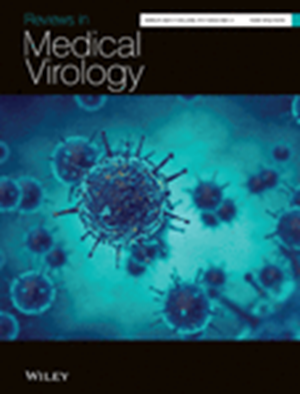评估多巴胺能通路与严重急性呼吸系统综合征冠状病毒 2 感染之间的关系、相关神经病理学特征以及 COVID-19 感染的潜在治疗方法
IF 9
2区 医学
Q1 VIROLOGY
引用次数: 0
摘要
多巴胺是一种已知的儿茶酚胺神经递质,参与多种生理过程,包括运动控制、动机、奖赏、认知和免疫功能。多巴胺受体广泛分布于神经系统和免疫细胞中。包括人类免疫缺陷病毒和日本脑炎病毒在内的多种病毒可利用多巴胺能受体在神经系统中复制,并参与病毒的神经发病过程。此外,研究表明,多巴胺能受体可能在严重急性呼吸系统综合征冠状病毒 2(SARS-CoV-2)感染的进展和发病机制中发挥作用。当 SARS-CoV-2 与神经细胞表面的血管紧张素转换酶 2 受体结合后,病毒的尖峰蛋白可与邻近细胞上的多巴胺能受体结合,从而加速其生命周期并加重神经症状。此外,最新研究表明,多巴胺是免疫-神经内分泌系统的重要调节因子。大多数免疫细胞都表达多巴胺受体和其他多巴胺相关蛋白,这表明多巴胺能免疫调节的重要性。SARS-CoV2 感染期间多巴胺浓度的增加可能会降低促进病毒传播的免疫力(先天性和适应性),从而导致神经元损伤。此外,神经系统中的多巴胺能信号也可能受到 SARS-CoV-2 感染的影响。COVID -19与免疫系统相互作用,可引起各种神经系统症状。针对 COVID -19 患者的一种可能的治疗策略是使用多巴胺拮抗剂。为了充分了解如何保护神经系统和免疫细胞免受病毒感染,我们需要研究多巴胺系统在 SARS-CoV-2 感染中的病理生理学。本文章由计算机程序翻译,如有差异,请以英文原文为准。
Assessment of the relationship between the dopaminergic pathway and severe acute respiratory syndrome coronavirus 2 infection, with related neuropathological features, and potential therapeutic approaches in COVID‐19 infection
Dopamine is a known catecholamine neurotransmitter involved in several physiological processes, including motor control, motivation, reward, cognition, and immune function. Dopamine receptors are widely distributed throughout the nervous system and in immune cells. Several viruses, including human immunodeficiency virus and Japanese encephalitis virus, can use dopaminergic receptors to replicate in the nervous system and are involved in viral neuropathogenesis. In addition, studies suggest that dopaminergic receptors may play a role in the progression and pathogenesis of severe acute respiratory syndrome coronavirus 2 (SARS‐CoV‐2) infection. When SARS‐CoV‐2 binds to angiotensin‐converting enzyme 2 receptors on the surface of neuronal cells, the spike protein of the virus can bind to dopaminergic receptors on neighbouring cells to accelerate its life cycle and exacerbate neurological symptoms. In addition, recent research has shown that dopamine is an important regulator of the immune‐neuroendocrine system. Most immune cells express dopamine receptors and other dopamine‐related proteins, indicating the importance of dopaminergic immune regulation. The increase in dopamine concentration during SARS‐CoV2 infection may reduce immunity (innate and adaptive) that promotes viral spread, which could lead to neuronal damage. In addition, dopaminergic signalling in the nervous system may be affected by SARS‐CoV‐2 infection. COVID ‐19 can cause various neurological symptoms as it interacts with the immune system. One possible treatment strategy for COVID ‐19 patients could be the use of dopamine antagonists. To fully understand how to protect the neurological system and immune cells from the virus, we need to study the pathophysiology of the dopamine system in SARS‐CoV‐2 infection.
求助全文
通过发布文献求助,成功后即可免费获取论文全文。
去求助
来源期刊

Reviews in Medical Virology
医学-病毒学
CiteScore
21.40
自引率
0.90%
发文量
88
期刊介绍:
Reviews in Medical Virology aims to provide articles reviewing conceptual or technological advances in diverse areas of virology. The journal covers topics such as molecular biology, cell biology, replication, pathogenesis, immunology, immunization, epidemiology, diagnosis, treatment of viruses of medical importance, and COVID-19 research. The journal has an Impact Factor of 6.989 for the year 2020.
The readership of the journal includes clinicians, virologists, medical microbiologists, molecular biologists, infectious disease specialists, and immunologists. Reviews in Medical Virology is indexed and abstracted in databases such as CABI, Abstracts in Anthropology, ProQuest, Embase, MEDLINE/PubMed, ProQuest Central K-494, SCOPUS, and Web of Science et,al.
 求助内容:
求助内容: 应助结果提醒方式:
应助结果提醒方式:


